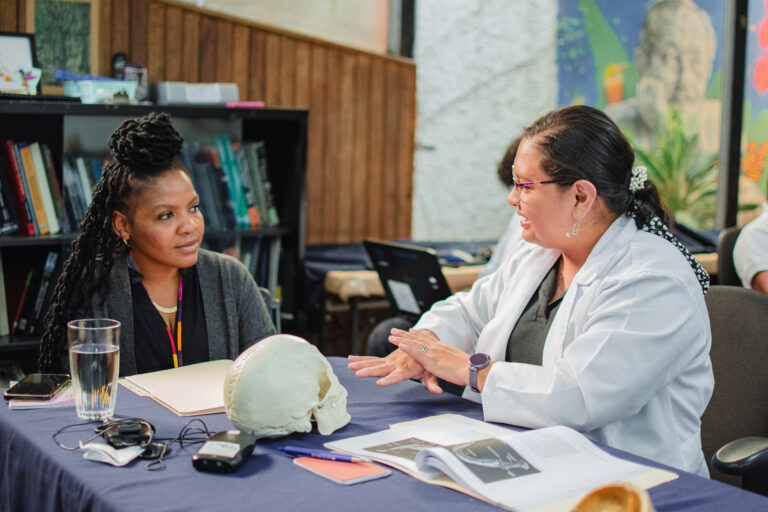Democratizing Documentation and Forensics
GIJTR’s documentation work centers on training local documenters, who are often survivors themselves, to collect other survivors’ testimonies.

For Spanish
The documentation of human rights abuses and the collection of forensics in the search for missing and disappeared persons are critical actions to building support for accountability processes and broader public acknowledgement of human rights abuses. Before GIJTR, affected communities were largely limited to providing testimonies and DNA samples to multiple state or international actors, who in turn provided limited information on how victims’ and families of victims’ evidence would be used. GIJTR has sought to challenge this prevailing practice of extractive documentation and forensics collection. In turn, this has shifted how the transitional justice field captures and preserves violations, both for the public record and for future accountability purposes even during times of active conflict.
GIJTR’s documentation work centers on training local documenters, who are often survivors themselves, to collect other survivors’ testimonies. The training of local documenters, who are generally more trusted in their communities than international actors, results in more accurate and detailed testimonies that ensures often overlooked violations, including conflict-related sexual violence, are addressed and that victims receive mental health and psychosocial services so they can begin to heal.
GIJTR’s forensics approach emerged from the recognition that despite the importance of forensics technologies in the pursuit of truth and justice, many countries lack the resources and capacity to carry out complex forensics investigations. GIJTR launched the Forensics Academy in 2018 to ensure that forensic investigations are more inclusive of family members of the missing, and more accessible to civil society actors. The Academy has had transformational impacts at individual, community and organizational levels, as well as on the field of forensics, which within transitional justice was almost always previously limited to state-sanctioned processes.
This section of the exhibition showcases the work of GIJTR’s local partners in victim-centered and community-led initiatives that have exemplified the importance of democratizing and making accessible documentation capacities and forensics technologies.
Bangladesh- Rohingya Documentation Program
This painting is one of many large-scale paintings created collectively by groups of 10 to 12 refugees in the Rohingya camps in Cox’s Bazar, Bangladesh through the Art Against Genocide program supported by GIJTR. The paintings illustrate stories of refugees’ persecution by the Tatmadaw military, their exodus from Myanmar to Bangladesh and their life in the camps. UNHCR reports that the majority of these refugees are women and children – with more than 40 percent under the age of 12.
Bangladesh- Rohingya Documentation Program
These embroidered cloth screens were created by refugees in the Rohingya camps in Cox’s Bazar through the Art Against Genocide program, supported by GIJTR. They primarily tell stories of women’s lives in the community before the exodus, during the violence, and in the Bangladesh camps.
Bangladesh- Rohingya Documentation Program
Huilla bags are traditional Rohingya shoulder bags featuring embroidery (applique) works. As part of GIJTR’s work with victims in the refugee camps in Cox’s Bazar, Bangladesh, a total of ten bags were created that each portrayed the experiences of survivors of the genocide in Myanmar.
Bangladesh- Rohingya Documentation Program
In collaboration with Arts Against Rohingya Genocide, a four-part documentary video was produced with GIJTR support. The documentary film was made by a team of Rohingya and Bangladeshi artists through an independent Rohingya production team called AARAR Productions (Our Productions in Rohingya), and concentrates on the life in the camps and other relevant community issues such as the importance of preserving traditional agricultural Rohingya practices even in the challenging conditions of the refugee camps.
The Forensic Academy: Building Capacity to Support Families of Enforced Disappearances
The Women’s Association for Victims’ Empowerment (WAVE) is a Gambian victim-led CSO. Through GIJTR’s Forensics Academy, WAVE produced the following video documentary featuring affected families, stakeholders and other targeted groups sharing their perspectives about enforced disappearance with action-oriented recommendations for stakeholders. The project is aimed at capturing the voices of those who do not have the opportunity to get the closure they yearn for following news of the enforced disappearance of their family member while also highlighting their pains and expectations with the ongoing transitional justice process.
The Forensic Academy: Building Capacity to Support Families of Enforced Disappearances
Through the Forensics Academy and GIJTR support, participant Mirak Raheem developed a trilingual and accessible guide for families of the missing and disappeared in Sri Lanka to understand the mass grave investigation process there. The guide was prepared in a consultative manner and seeks to enhance both public understanding about the issue and its importance to the search for the disappeared. An accompanying booklet is available in English, Sinhala and Tamil.
Supported by GIJTR, this documentary was produced by the National Coalition in Support of Reconciliation in Guinea (CONAREG), a network of civil society and community-based organizations working on violence prevention and transitional justice across Guinea. The documentary highlights the many waves of human rights violations that have taken place in Guinea since the country’s independence and features testimonies of survivors.
Bangladesh- Rohingya Documentation Program
As one of the workshops conducted as part of the Art Against Rohingya Genocide program, survivor participants from the Rohingya refugee camps in Cox’s Bazar shared their stories of human rights abuses in a real-size drawing of their body’s silhouette, decorated with symbols of their past pains, memories and dreams.
